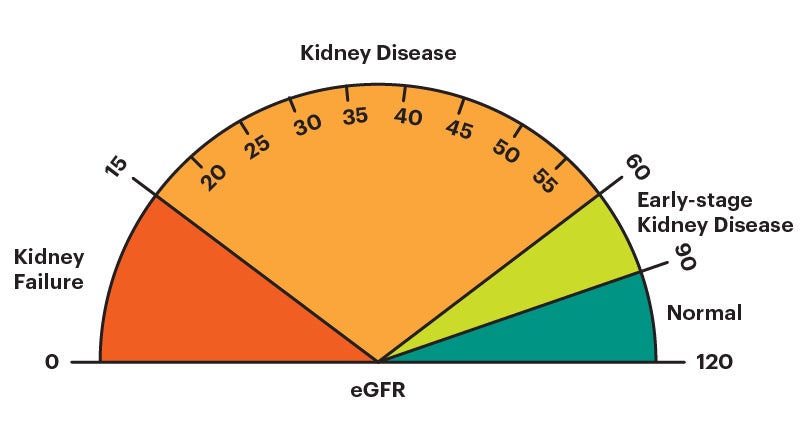5 stages of CKD

Below are the 5 stages in the CKD classification.
The CKD stage describes the severity of the chronic kidney disease – the higher the grade (stage), the worse the kidney function.
The 5 stages are based on something called ‘GFR’ (glomerular filtration rate). Normal GFR is 90-120 mls/min.
GFR is a blood test which estimates the level of function of the kidney – the higher the GFR, the better the kidney function (and therefore the lower stage of CKD that the patient will be in).

5 stages of CKD
We will now go through the 5 CKD stages in more detail.
CKD1+2 – Risk factor for developing CKD (eGFR 60-120 mls/min; i.e. kidney function can be normal at these stages)
- Symptoms: no symptoms
- Treatment: no specific treatment for this stage of CKD. Risk factors for CKD should be looked at and treated if needed (for example high blood pressure). A risk factor in this example is a lifestyle or environmental factor that increases the chance of developing a medical condition
- Progression: not all patients in CKD1-2 progress to CKD3. Some can get better.
CKD3A+B – Mild CKD (eGFR 30-59 mls/min)
- Symptoms: no symptoms or mild symptoms
- Treatment: treat the cause of CKD, and make sure blood pressure and blood glucose are in the correct range (if diabetic). This will help stop CKD worsening
- Progression: not all patients in CKD3 progress to CKD4. Many stabilise, and a few get better.
CKD4 – Moderate CKD (eGFR 15-29 mls/min)
- Symptoms: moderate
- Treatment: treat cause of CKD and ensure blood pressure and blood glucose are in the right range
- Progression: many (but not all) patients in CKD4 progress to CKD5. Some stabilise, and a few get better.
Note. Some patients need to prepare for dialysis or transplant when their CKD becomes stage 4.
CKD5 – Severe CKD (kidney failure) (eGFR < 15 mls/min)
- Symptoms: severe
- Treatment: start dialysis or kidney transplant, or give supportive care (no dialysis/transplant)
- Progression: a small number of patients in CKD5 come off dialysis, and revert to to CKD4 (or better). Most need lifelong dialysis or a kidney transplant.
Summary
We have described the 5 stages of CKD. We hope it has been helpful.

